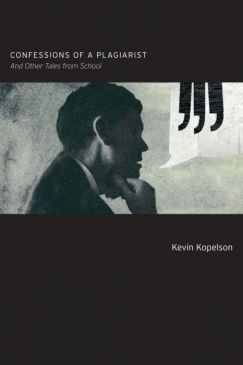Confessions of a Plagiarist and Other Tales from School by Kevin Kopelson. 240 pages.
KEVIN KOPELSON TELLS US that he sometimes rhapsodizes about literature in his undergraduate classes, which is not hard to imagine: this book is a rhapsody. What Kopelson celebrates here is his own life: his shy brilliance as a young man; his early graduation from Yale; his interest in music; his law degree; his graduate study at Brown; everything about his education and his teachers, that he can remember. With another writer, this might be off-putting or narcissistic; but Kopelson makes this all come together in a fascinatingly complex rendition of himself. He also tells us everything about his love life; his family, especially his older brother Steve, who died tragically in his early twenties; and all those writers and critics who have inspired or, it seems, annoyed him.
Kopelson’s confession is a performance; or rather, it is performative. Confession is useful in situations such as this because it sets up instant intimacy — you form a special bond with your confessor — and this intimacy encourages a style that is disarming. Whether Kopelson is talking about borrowing an essay of his older brother’s in order to apply to a Music School — one of the celebrated “plagiarisms” of the title — or he is describing a heartbreaking love affair with a besotted young Druze in the depths of Israel, he manages to mesmerize us. This is not just because he wants desperately to please, as the book makes clear throughout, but also because he has chosen a narrative form that encourages him to bare his soul.
The many different kinds of plagiarism he talks about in the startling opening chapter, all committed by a senior scholar at a major research institution, are nothing less than appalling. We can never know how much the bravado of confessional writing might have tempted him to exaggerate. In any case, Kopelson’s self-exposure is meant to encourage us towards self-examination, to wonder how much of what we do, as writers, as scholars, is a kind of quasi-plagiarism. After all, we read criticism in order to write about a text. We quote from the text, and from other texts, when we do. We cite those religiously, but we also, undoubtedly, channel other things we've read, we make arguments that we might never have made if we hadn't read similar arguments elsewhere. You might say this is not plagiarism, and I agree. But reading this book made me think again about how much our writing relies on things others have written.
Kopelson quotes shamelessly from others and from himself. Indeed, this book offers a good primer for the works of Kevin Kopelson; when he thinks something from an early work enhances a point he is making, he quotes from it wholesale, plagiarizing himself. He also quotes from writers and critics he likes, such as Marcel Proust, Roland Barthes, Eve Kosofsky Sedgwick, D. A. Miller, Charles Rosen, and others. His pedigree, as it were, is easy to spot, and his influences are deeply embedded in his wonderful prose.
But if the book is about what we gain from others, it is also richly and movingly about loss. Kopelson’s brother Steve is the never-accommodated loss that motivates a lot of soul-searching. Past lovers and friends, many of whom died of AIDS, are also touchingly remembered and beautifully inscribed. Kopelson talks about disgust in the last chapter: disgust with the state of queer studies; disgust with bad work that is promoted for political reasons; disgust with his own writing. But the real thread through this work is not so much disgust as sadness. And out of this sadness, he has produced a beautiful book.
¤
Recommended Reads:
Mark Haskell Smith on The Ecstasy of Influence: Nonfictions, Etc. by Jonathan Lethem: "Half Termite, Half Elephant"
LARB Contributor
George Haggerty’s books include Gothic Fiction/Gothic Form. (1989), Unnatural Affections: Women and Fiction in the Later 18th Century (1998), Men in Love; Masculinity and Sexuality in the 18th Century (1999), and Queer Gothic (2006). He co-edited Professions of Desire: Lesbian and Gay Studies in Literature (1995), The Blackwell Companion to LGBT/Q Studies (2007), and was general editor of The Encyclopedia of Gay Histories and Cultures (2000).
LARB Staff Recommendations
Hubris and Envy: The Lehrer Affair
A very different take on l‘affaire Lehrer
Dead or Straight: The Conundrum of the Lesbian Coming-of-Age Story
How true, how frequent, is the "dead or straight" binary to the lesbian novel at large?
Did you know LARB is a reader-supported nonprofit?
LARB publishes daily without a paywall as part of our mission to make rigorous, incisive, and engaging writing on every aspect of literature, culture, and the arts freely accessible to the public. Help us continue this work with your tax-deductible donation today!
